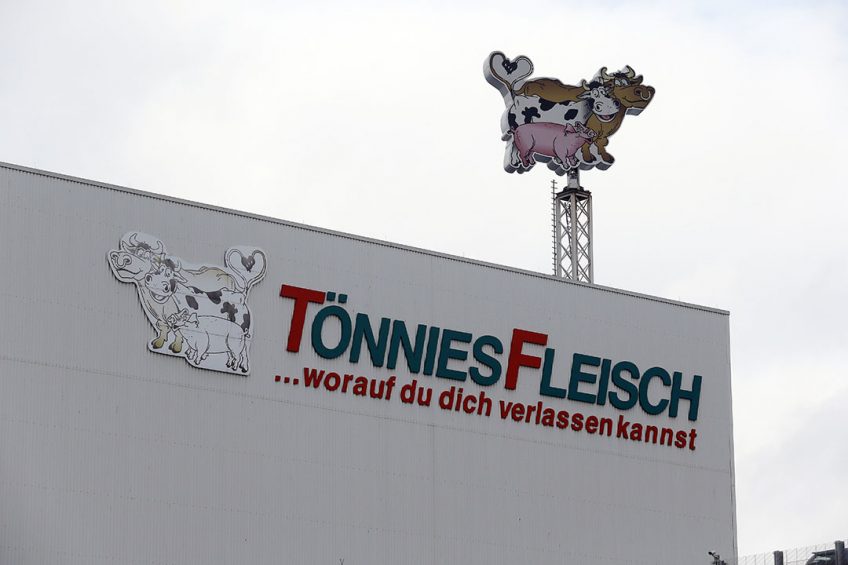Covid-19: Meatpacker Tönnies might restart, with safety plan

Germany’s largest pig slaughterhouse in Rheda-Wiedenbrück, owned by Tönnies, will be allowed to reopen once a safety plan has been put in place. Meanwhile, the effects of Covid-19 on the European pig markets can be felt.
The Gütersloh district, which includes the slaughterhouse, communicated on Monda July 6th that it was in constructive talks with Tönnies. Local governor Sven-Georg Adenauer said, “One thing is certain: there will only be a restart if everything is safe. Tönnies must implement the new concepts according to the requirements of the authorities.”
Landrat Adenauer: "Das OVG-Urteil hat keine Auswirkungen auf Tönnies. Mit dem Unternehmen sind wir in konstruktiven Gesprächen und eines ist sicher: Einen Neustart gibt es erst, wenn alles sicher ist. Tönnies muss die Konzepte nach den Vorgaben der Behörden umsetzen.“ (bebe) pic.twitter.com/hX0Y3DVEjJ
— Kreis Gütersloh (@KreisGuetersloh) July 6, 2020
Lockdown in Gütersloh should be lifted
The message came when a judge ruled that the lockdown in the entire region of Gütersloh should be lifted. The region had gone back into a lockdown after over 1,400 employees of Tönnies had tested positive for Covid-19.
More targeted measures
The authorities should have applied more targeted measures, according to the court. In the area, which houses 360,000 inhabitants, the infection levels dropped to an acceptable level in recent days – and a relief of the lockdown regulations was already expected.
Tönnies has to prove restart readiness
Last week, Karl-Josef Laumann, secretary of Labour, Health and Social Affairs in the German state North Rhine Westphalia, explained that the Tönnies slaughterhouse will have to prove it is ready for a restart. The slaughterhouse has to provide a proposal which will include how employees can work safely, without the risk of contracting Covid-19. A different meatpacker, Westfleisch, did something comparable recently. Then it will be up to the Gütersloh district whether or not it is time to re-open the Tönnies site.
70,000 to 100,000 pigs not slaughtered
Laumann said at the time that the measures have an enormous impact. On average every week about 70,000 pigs cannot be sent to slaughter, the effect of which trickles through to sow farms, as weaner pigs cannot be transported elsewhere. He emphasised that public health, nevertheless, will remain top priority.

Covid-19 Up-date
What impact is the pandemic having on the global pig sector and how are they dealing with it.
ISN: Tönnies should be back in business swiftly
According to the ISN, the German trade union for pig producers, it’s not 70,000 but at least 100,000 pigs that are not being slaughtered weekly. The ISN feels that the slaughterhouse should be back in business as soon as possible. After all, the main cause of the spread was found rapidly, as the climate control installation was identified as main culprit.
‘Absurd’
ISN chairman Heinrich Dierkes called it ‘absurd’ last week, that any perspective for a restart was missing. He said, “Obviously everything has to be done to prevent new Covid-19 infections with both employees and customers. But that pig producers still don’t know what is going to happen, that situation is not sustainable.”
The ISN called onto both Tönnies as well as the authorities to stop quarreling and instead create a time path to reopen the plant.
Outbreaks on plants in France and Austria
Elsewhere in Europe, Covid-19 has an effect on pig slaughterhouses as well. Local health authorities closed the French abattoir Holvia Porc in Laval last week, when Covid-19 was determined in 28 of the 230 employees.
Holvia Porc, part of the cooperative Terrena, is one of France’s largest pig slaughterhouses. In an earlier stage, activities in an abattoir in Azé, near Maçon, were temporarily suspended due to a cluster of Covid-19 infections.
Also in Austria, 3 large meat processors have found Covid-19. 2 of them are located relatively close to the border with Germany. In total, 12 employees were tested positive for the virus. 7 cases in total were found in a slaughterhouse in the district Ried im Innkreis. In the district Braunau another 2 cases were found and 3 occurred in the district Wels-Land.
China bans pork from the Netherlands
The reports from various slaughter plants have led to China being more careful when importing pork, as it wishes to avoid a re-entrance of the virus through meat, even though this infection route is not proven.
The country already temporarily closed its borders for meat from Tönnies and now, 4 locations of 3 meatpackers in the Netherlands have been suspended for exports to China as well. The ban applies to Vion’s plants in Boxtel and Groenlo, as well as Van Rooi Meat in Helmond and Westfort in Gorinchem. It is unclear as to when exports might be resumed and whether or not meat already underway is allowed to enter.
Another pork plant in Germany has been told to stop shipping pork to China for a while, just like plants in Ireland, Spain, the UK, USA and Brazil.
Effect on pig prices
All in all, Covid-19 caused a disruption of the meat markets, a suspension of some plants plus an export stop to China. All this has put pressure on pig prices. In Germany the Vereinigungspreis for 1 kg of pig meat went down by € 0.06 to € 1.60 where over the last year until April, prices have been around € 1.80 or even higher.
The prices in the Netherlands even dropped further; prices of meatpacker Vion dropped to € 1.47/kg slaughter weight this week. At its zenith, early December, this price was still at € 2.12/kg – due to a strong demand from China due to African Swine Fever. It is the first time in 15 months that the price dropped below € 1.50/kg. Similarly, it is also difficult to sell sows to slaughterhouses.












